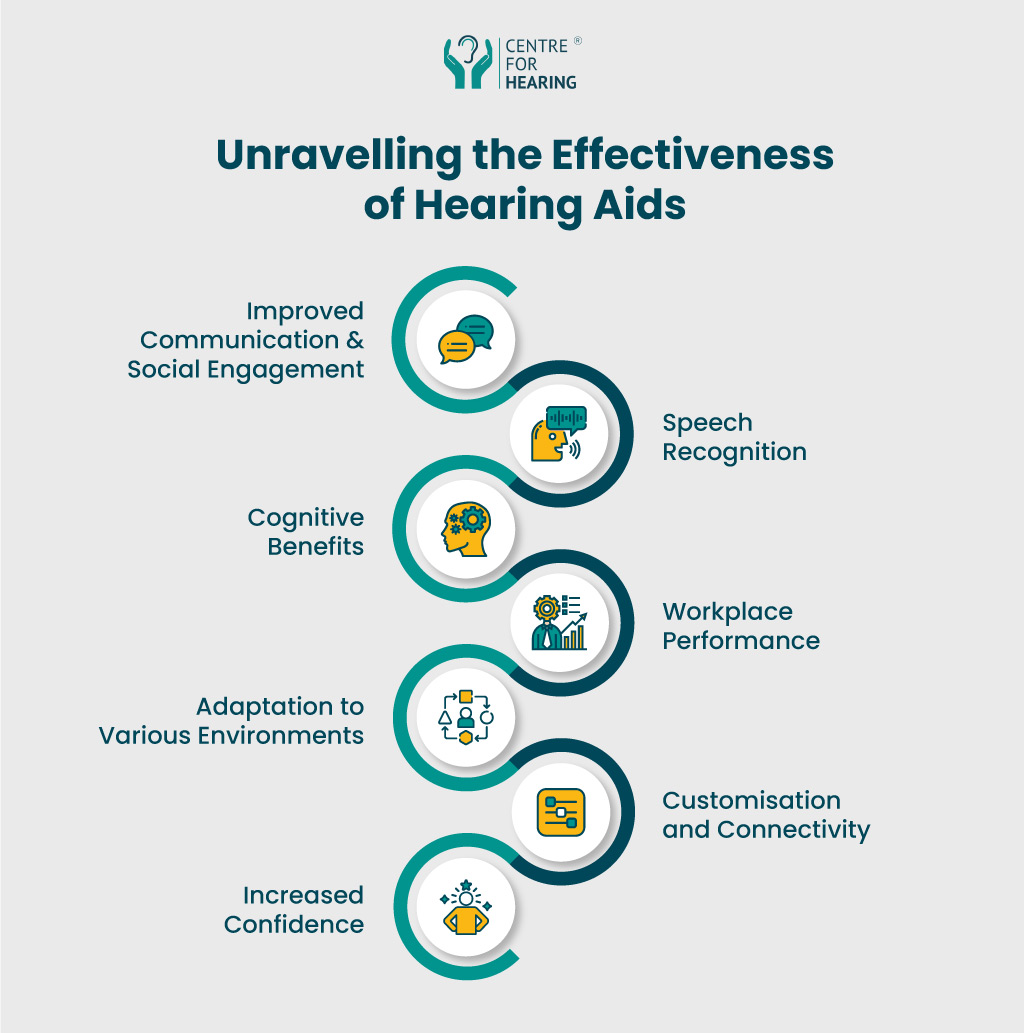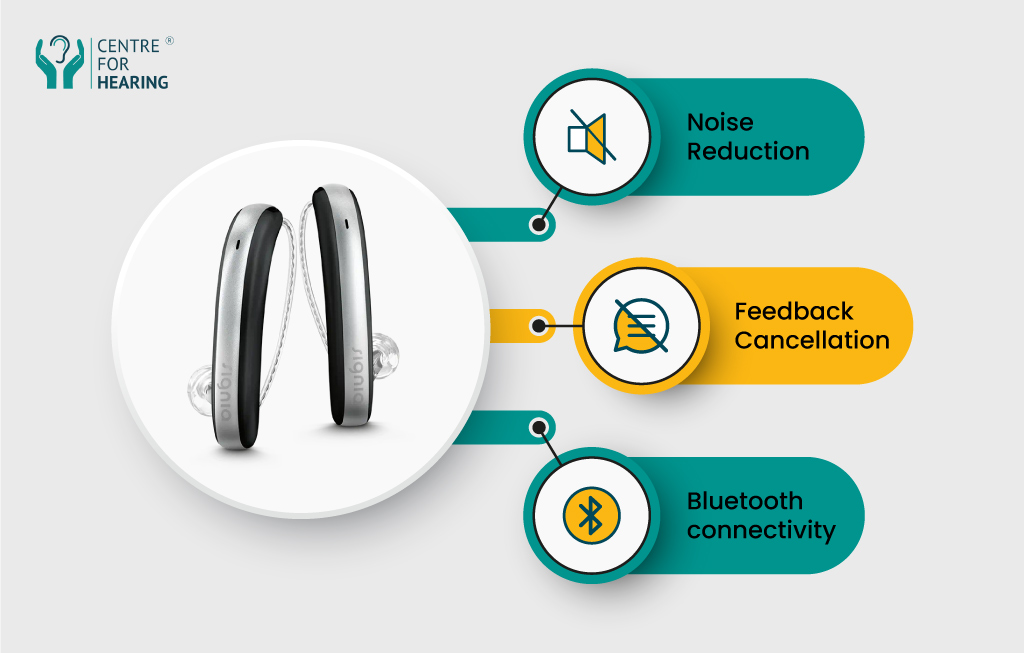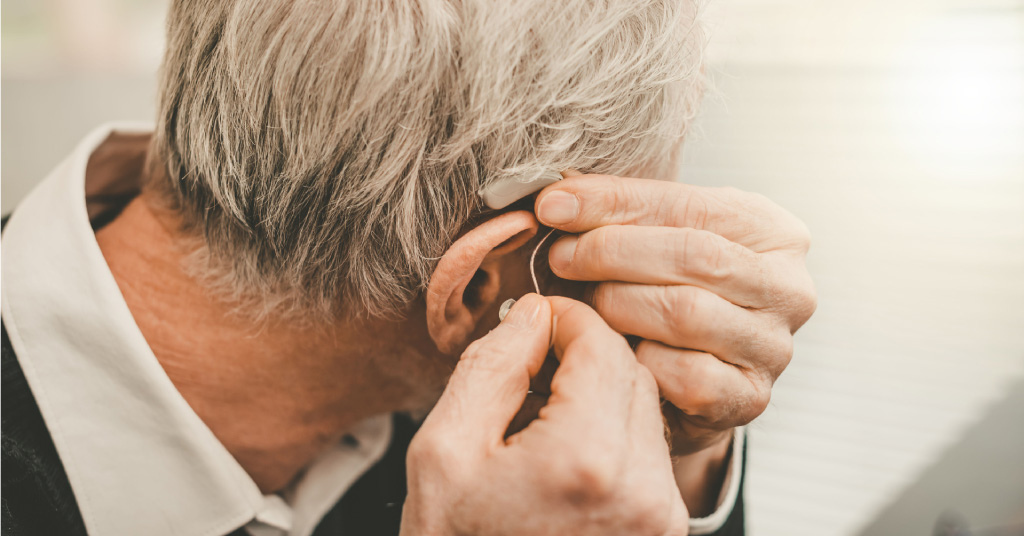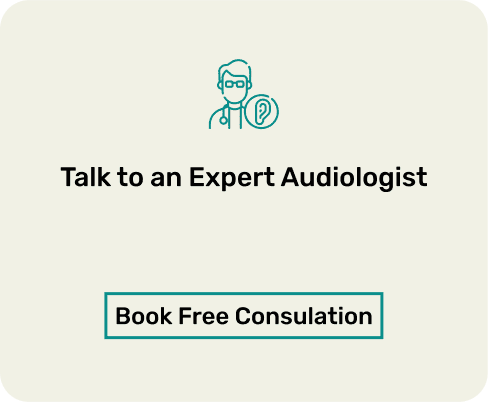Hearing health is undergoing a remarkable transformation with the soaring adoption of hearing aids—a testament to the pivotal role these technological devices play in bettering the quality of lives.
Recent statistics shed light on the magnitude of this surge, indicating a global market size of $8.5 billion in 2021, with a projected CAGR of 5.2% from 2022 to 2028.
Furthermore, an increasing prevalence of hearing loss underscores the need to diagnose hearing loss early on and embrace hearing support devices.
However, the decision to invest in these devices is not straightforward. There are various considerations influencing their effectiveness, including the degree of hearing loss, lifestyle, cost, and comfort.
In this guide, we explore the key considerations before purchasing the most effective hearing aids for your needs.
Unravelling the Effectiveness of Hearing Aids

Hearing aids have transformed how people with hearing impairments hear and experience their surroundings. Individual lifestyles, degrees of hearing loss, and the consequences of hearing impairment vary significantly from person to person. So, the effectiveness of your devices hinges on how well they cater to your distinctive needs.
Here is how hearing devices can help individuals with hearing loss:
1. Improved Communication & Social Engagement
Hearing loss often comes as a significant impediment to normal social lives. Improving communication is one of the main advantages of wearing the aids. It significantly amplifies sounds, making it easier for individuals to hear conversations, engage in social interactions, and participate in various activities.
2. Speech Recognition
Another crucial purpose of hearing aids is to enhance speech understanding. You can recognise voices better with digital aids, and many devices adapt the reception of frequencies based on the immediate environment.
This becomes especially vital in noisy settings when background noise might make it difficult to grasp what is being spoken.
3. Cognitive Benefits
Research suggests a strong connection between cognitive decline and untreated hearing loss. Effective hearing support devices contribute to cognitive well-being by providing the brain with consistent auditory stimulation.
Studies also suggest that maintaining auditory stimulation through improved hearing may help reduce the risk of cognitive decline and conditions like dementia.
4. Workplace Performance
Clear communication is essential in the workplace, and these devices can help individuals hear instructions, participate in meetings, and collaborate effectively with colleagues.
5. Adaptation to Various Environments
Modern aids come equipped with advanced features such as noise reduction and directional microphones, allowing wearers to adapt to different environments. Whether in a quiet room or a bustling restaurant, hearing aids can be adjusted to optimise sound perception.
6. Customisation and Connectivity
Numerous aids have programmable settings to accommodate different needs and preferences. Additionally, some models have several connectivity options that let users stream audio straight to their devices from TVs, smartphones, and other devices.
7. Increased Confidence
Hearing aids can boost self-confidence by enabling individuals to actively participate in conversations without constantly asking for repetition.
Buying New Hearing Aids: 14 Factors to Consider
Here are some important things to consider before you make the purchase:
1. Degree and Type of Hearing Loss
You need to understand the extent and nature of your hearing loss to get the proper treatment. Different hearing devices have been developed to address various degrees and types of hearing difficulties.
For example, Completely-In-the-Canal (CIC) hearing aids are suitable for individuals with mild to moderate hearing loss. You should consult an audiologist to learn more about the type of hearing loss.
2. Consultation with an Audiologist

You should schedule a comprehensive hearing evaluation with an audiologist. Complete all the tests required for proper determination of your hearing loss problem and get a suitable solution. Professional guidance will help you determine the most appropriate type and features for your hearing aids.
3. Style and Design
Choose a hearing aid style that aligns with your preferences in terms of visibility, comfort, and aesthetics. Common styles include in-the-canal (ITC), receiver-in-canal (RIC), and behind-the-ear (BTE).
4. Technological Features

You must consider the technological features that best suit your lifestyle. Features like noise reduction, feedback cancellation, and Bluetooth connectivity can enhance your overall experience.
5. Budget
Determine your budget for hearing devices. Discovering a balance between the required features and the cost might be crucial, as prices can differ significantly.
6. User-Friendliness
Evaluate the hearing devices’ ease of use, controls, and maintenance needs. Choose devices based on your comfort level of technology use.
7. Trial Period

Many hearing aid providers offer trial periods. Use these trials to evaluate the devices in practical settings and ensure they meet your expectations.
8. Warranty and Support
Knowing the coverage for repairs and maintenance is crucial for the long-term performance of your hearing aids.
9. Comfort and Fit
Ensure a proper fit for comfort and optimal performance. Custom-fit options may be necessary for some individuals, while others may find standard sizes suitable.
You can find the right fit by consulting an audiologist.
10. Lifestyle and Environment
Some hearing aids are designed for specific situations, such as those with enhanced features for conversations in noisy settings or outdoor activities.
11. Follow-up Appointments

Regular adjustments and check-ups are essential to address any issues and ensure the continued effectiveness of your hearing aids.
12. Battery Life and Power Options
Consider the runtime of the battery-powered aids and the convenience of battery replacement. Some models offer rechargeable options, eliminating the need for regular battery changes.
13. Integration with Other Devices
If you use other electronic devices, consider aids that offer compatibility or connectivity options. This could include Bluetooth connectivity for seamless integration with smartphones, TVs, and other gadgets.
14. Brand Reputation and Reviews
Research the reputation of different hearing aid brands and read reviews from other users. This can provide insights into specific models’ reliability and customer satisfaction.
Centre for Hearing® fulfils all the above considerations while also giving you the option to choose from internationally renowned brands like Phonak, Oticon, Signia, Starkey, Widex, Resound, etc.
It’s also easier to get treated by this hearing care centre as the centres are present in various locations across Mumbai, Delhi, Chandigarh Tricity Area, Gurgaon, and Punjab.
Transformative Hearing Aid Solutions from the Centre for Hearing®
Choosing the right hearing aid is a pivotal decision with far-reaching impacts on one’s daily life.
To ease the complication, the Centre for Hearing® emerges as a beacon of expertise, offering solutions that not only address hearing difficulties but also enhance communication, mitigate social isolation, boost cognitive function, and improve emotional well-being.
By prioritising in-person consultations, quality over affordability, and embracing cutting-edge digital technology, the Centre for Hearing® ensures that individuals embark on a journey to rediscover the joy of clear and vibrant sound.
Contact us now and book your consultation!



















